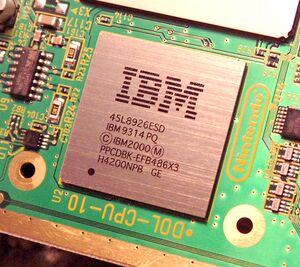GameCube/Hardware Documentation
Consider helping fill this page in with information such as that found in the following sources:
More information: Gekko, GX, Flipper, DSP, GameCube technical specifications (Wikipedia)
The GameCube has four main components; a CPU (Gekko), a GPU (GX), a DSP, and a system ASIC (Flipper).
The CPU is a semi-custom derivative of the PowerPC 750, which was also notably used (under the name "PowerPC G3") in several late 90s-early 2000s Macs. It is a superset of later PPC750 variants, with additional instructions for accelerated media and graphics processing. Some newer PowerPC 750-based Macs can also use these instructions if the correct HID register bits are set.
The GPU is fully custom; it was developed by ArtX, a startup which spun off from the Silicon Graphics Nintendo 64 hardware development team. ArtX was bought out by ATI in 2000, just as the GPU design was being completed; as such, the GameCube has ATI branding, although its hardware has no relation to ATI products preceding it. After purchasing ArtX, ATI used their GPU technology in Radeon video cards starting with the acclaimed R300 series, making the GameCube's GPU an ancestor of modern PC GPUs.
Uncited: The DSP is believed to be a custom 16-bit chip developed by Macronix. It is used as a coprocessor for audio, memory card DRM, and GBA link cable DRM. It runs microcode written in assembly. It has a decoder for ADPCM, a custom Nintendo audio codec used up to the Wii U/3DS. It has 8KB of instruction RAM and 4KB of data RAM, with an internal Macronix bootrom which loads microcode provided by the game or IPL.
The system ASIC (similar to the chipset on a PC motherboard, implementing peripheral interfaces and other system functions) is fully custom, having been co-developed by ArtX, NEC and Nintendo.
The GameCube has three banks of RAM; a main 24MB general-purpose bank ("Splash"), a slow 16MB bank intended primarily for use as an audio buffer ("ARAM"), and a 3MB VRAM bank which is embedded within the GPU.
The GameCube's architecture would later evolve into that of the Wii and Wii U.
